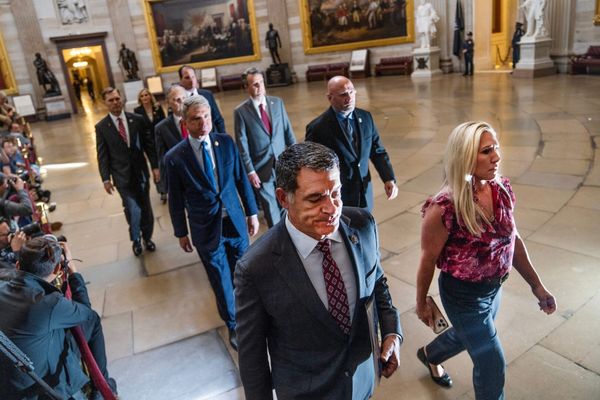
There was no red wave. Republicans, though still poised to take the House, under-performed, while Democrats breathed a huge sigh of relief.
It was a good night for Joe Biden, and a miserable one for Donald Trump.
Here are five takeaways from a midterm election the public polls, unlike two years ago, largely got right:
Trump is damaged goods
Trump is still the dominant figure in the Republican Party, and he’ll be the favorite to win the GOP nomination for president if, as expected, he runs again.
But Trump’s place in the party is far weaker after Tuesday. Truth is, if not for the former president’s interventions, the night could have been a lot better for the GOP.
Just look at how the most Trump-y candidates fared in states where more traditionalist Republicans were on the same ballot.
In Georgia, Herschel Walker was locked in a neck-and-neck contest with Democratic Sen. Raphael Warnock. Gov. Brian Kemp, whose resistance to overturning the 2020 results infuriated Trump, easily defeated his Democratic opponent, Stacey Abrams.
In New Hampshire, Republican Don Bolduc lost to Sen. Maggie Hassan in a race that didn’t even look close, while Gov. Chris Sununu, who once referred to Trump as “fucking crazy,” cruised to reelection. Trump’s preferred candidate in Ohio, J.D. Vance, did better, beating Democratic Rep. Tim Ryan by a comfortable margin in that state’s U.S. Senate race. But he came nowhere close to the margin that incumbent Gov. Mike DeWine, a more traditionalist Republican, put up.
In Arizona, it was still early, with only about half of the expected vote in. But Kari Lake was running behind Katie Hobbs. Even if she comes back to win, it will be a closer race than political professionals of both parties had predicted had a more traditionalist Republican, Karrin Taylor Robson, made it through.
“I mean, come on,” said Chuck Coughlin, a veteran Republican strategist based in Phoenix. “This should be a walk in the park for Republicans ... If Karrin Taylor Robson was the [gubernatorial] nominee, it would be an ass-kicking this cycle. But we just have such poor candidates who don’t appeal to a broader base.”
Besides, Coughlin said, “This is a non-presidential cycle, which tilts against the White House, tilts against the party in power. That’s not going to be the case in a presidential cycle. [Trump] doesn’t have that wind at his back anymore.”
Ron DeSantis, the Republican governor of Florida — and a potential rival to Trump — won reelection in a 20-point landslide. In 2020, Trump carried the state by just more than 3 percentage points.
Biden has a calendar problem
With Tuesday looking a lot better for Democrats than expected, it’s possible we’ll see some rallying around Biden. Presidents who suffered much more punishing midterms went on to win second terms.
So, give Biden his due. But it’s hard to argue that Democrats over-performed on Tuesday because of Biden rather than in spite of him. His approval rating, hovering around 41 percent, is dismal — and has been all year. He’ll turn 80 this month, and earlier this year, a majority of Democrats polled said they’d prefer someone else to be the party’s nominee.
But one thing Biden did have going for him was the calendar, and the reluctance of Democrats to do anything that might hurt him — and, by extension, the party — ahead of the midterms.
That imperative is gone now. And though no prominent Democrat is likely to run a serious campaign against Biden, there will be increasing pressure on him, especially from the left, to step aside.
It’s already happening. On Wednesday, in an effort described first to POLITICO, a left-wing group that worked in 2020 to persuade progressives to support Biden will start airing digital ads in New Hampshire highlighting Biden’s “extremely low approval rating” and depicting him as a weak incumbent.
“We cannot risk losing in 2024,” says one ad, part of RootsAction.org’s “#DontRunJoe” campaign. “We shouldn’t gamble on Joe Biden’s low approval rating.”
Extremism is a Democratic issue, too
All year — and especially in the closing days of the campaign — Democrats cast themselves as a mainstream alternative to the excesses of the GOP. But despite the overturning of Roe v. Wade and the hundreds of election deniers Republicans put on the ballot, voters on Tuesday did not appear to see it that way.
In preliminary exit polls, about equal proportions of voters said Democrats and Republicans were “too extreme.” The exits mirrored a poll released just before the election by the center-left group Third Way found voters viewed Republicans and Democrats as similarly far from the center.
It hurt Republicans that abortion ranked high on voters’ list of concerns, just behind inflation. And some of the most prominent Republican election deniers went down, including Doug Mastriano, the Republican gubernatorial nominee in Pennsylvania. Lake might lose in Arizona, which few political observers expected.
But it’s not as though Democrats were viewed by voters as the reasonable party.
Part of that had to do with crime. All across the map, using grainy, black-and-white images and CCTV footage of crimes in progress, Republicans ran ads yoking Democrats to “defund the police,” bail reform and rising crime rates.
It didn’t work everywhere — and it didn’t work as well as Republicans had anticipated. But the legacy of “defund the police” is still getting in Democrats’ way.
In North Carolina, Cheri Beasley, a former state Supreme Court justice who was savaged by Republican advertising on crime, lost to Rep. Ted Budd in the U.S. Senate race. And in Wisconsin, it was only after the GOP began airing ads depicting Mandela Barnes as extreme on crime that Sen. Ron Johnson overtook him in the polls. Johnson was leading Barnes by a narrow margin late Tuesday.
The Democratic map fails to grow
In a reasonably good night for Democrats overall, the party’s biggest loss may not have been a candidate at all — but geography.
Yes, Democrats defended significant parts of their 2020 battleground map. But it was a different story in two big states that Democrats have reached for years to compete in. Republicans wiped Democrats off the map in Florida, a one-time swing state where DeSantis clobbered his Democratic opponent, former Gov. Charlie Crist, and Sen. Marco Rubio did the same to Rep. Val Demings in his reelection bid.
It was the same thing in Texas, where Gov. Greg Abbott blew out Beto O’Rourke. In his closer-than-expected U.S. Senate run in Texas four years ago, O’Rourke had embodied Democrats’ expectations that, some day soon, demographic shifts in Texas would turn that state blue. Instead, he was running more than 10 percentage points behind Abbott by the time the race was called, while Democrats were verging on being swept in statewide contests in the state.
Given those results, it’s going to be hard for Democrats in Texas and Florida in 2024 to argue that their states will be in play anytime soon.
One Democratic strategist who advises major party donors described the two states late Tuesday as “giant money sucks.”
Given Republican advantages there, he said, “There’s nothing we can do about those places.”
Republicans — and McCarthy — are in for a tough two years
The math is still on the side of Republicans taking the House. And the political problem confronting a party any time it gains power is that it will be expected to govern.
But it’s going to be even more complicated for Republicans than usual next year. For one thing, hard-liners in the GOP conference will now be part of a majority.
No longer will the Marjorie Taylor Greenes or Matt Gaetzes of the GOP be tweeting in the wind.
For Kevin McCarthy, the likely future speaker, that will make governing difficult. So will his party’s underwhelming performance on Tuesday. He set expectations much higher.
House Republicans are preparing to unload next year with a raft of investigations, including into the business dealings of Biden’s son, Hunter Biden, the coronavirus response and the U.S. withdrawal from Afghanistan. McCarthy will have to contend with calls from within the party for impeachment proceedings against Biden.
“Let the investigations begin,” said one Republican strategist who works on House campaigns. “It’s going to be brutal.”
It may backfire on Republicans, too, which is what Democrats are banking on.
“Once they’re in charge of something, they own it, and these Republicans are the most extreme political party in the history of the country, and they will do things like national abortion bans,” said Pete Giangreco, a longtime Democratic consultant. “These folks … they’re running every red light.”







